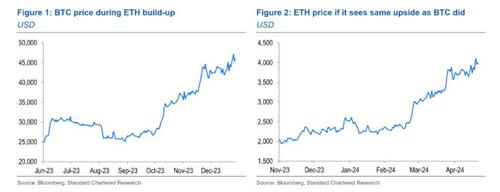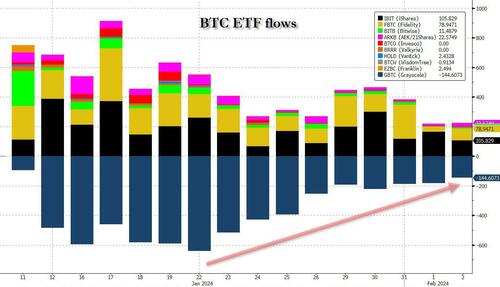Standard Chartered Sees Ether HItting $4,000 By May, When Ethereum ETF Is Approved

Image Source: Pixabay
One month ago, Standard Chartered predicted that with ETF approval in the rearview mirror, bitcoin would eventually rise up to $200,000. It has since turned its attention to ether and the inevitable Ethereum ETF approval, and while it does not follow up with a similarly bombastic forecast, it nonetheless sees ETH rising to $4,000 by May 23, when it expect the Ethereum ETH will be approved. Incidentally, we agree.
And now, frontrunning the ETH ETF
— zerohedge (@zerohedge) January 9, 2024
How do they get there? Well, as Std Chtd analyst Geoff Kendrick writes, the SEC approved 11 new spot Bitcoin ETFs on 10 January. The approvals, along with BTC price action before and since, provide valuable lessons for the ongoing Ethereum (ETH) ETF application process.
According to Kendrick, the SEC’s dominant strategy for ETH ETF applications is to replicate the BTC process. This partly reflects structural similarities between the two. During its case against Ripple in June 2023, the SEC did not list ETH (or BTC) among the 67 coins and tokens that it claimed were “securities". In addition, ETH - like BTC - is a listed and regulated futures contract on the Chicago Mercantile Exchange (CME).
As a result, the bank expects pending applications for ETH US spot ETFs to be approved on 23 May, the final deadline for the first of the ETFs under consideration - the equivalent date to 10 January for BTC ETFs. And if ETH prices perform similarly to how BTC prices performed in the lead-up to BTC ETF approval, Kendrick expects ETH to trade as high as $4,000 by then.
To be sure, for ETH prices to follow the same price pattern as BTC, Standard Chartered lays out three conditions that need to be met:
First, current market expectations for the probability of a 23 May approval date would have to be low, as was the case for BTC ETFs. This appears to be true; several media reports (for example from The Block, a leading digital-assets news provider) suggest that commentators are mixed on the chances of approval. 'No approval' expectations centre on the view that the SEC defines ETH as a security rather than a commodity - the argument that was at the heart of the Ripple case in 2023. Based on market commentary, we believe approval expectations are relatively low, likely below 50%.
Second, the market-implied probability of approval would have to be wrong. We also believe this is the case. While SEC Chair Gary Gensler did say during the SEC’s June 2023 lawsuit against Ripple that "everything other than Bitcoin is potentially a security“, ETH was not included among the 67 coins and tokens the SEC identified as securities at the time. Also notably, the SEC was not successful in that case - Ripple was ruled to be a security when sold to institutional clients, but not when purchased on exchanges. In addition, the SEC has since lost its case against Grayscale on the BTC ETF. Grayscale also has an ETH trust that it wants to turn into an ETF, so a denial of that application would likely lead to another appeal by Grayscale. Both BTC and ETH are listed and regulated futures on the CME, and we see no fundamental reason for the SEC to view ETH differently than the CME already does.
Third, several spot ETH ETFs would need to be approved on 23 May. In other words, the SEC would need to follow the same process that it did for BTC ETF approvals. We think this is highly likely. During the BTC ETF vetting process, the SEC continually postponed decisions, and stated publicly that they would not be approved right up to the time of approval. The SEC postponed decisions on two ETH ETFs (Blackrock and Fidelity) on 24 January and a third (Grayscale) on 25 January, and Gensler claimed that the BTC approval was a one-off. Indeed, we think a similar SEC approach to ETH ETFs is not only likely but also optimal in terms of ETH price impact, as it would create lower market expectations - maximising price upside as approval probability increased.
Looking beyond the ETF approval, Standard Charted believes that ETH is less susceptible to the post-approval selling that BTC has seen:
the BTC price fell to an intra-day low of USD 38,500 on 23 January from an intra-day high of USD 49,000 on 11 January. This is because the Grayscale Ethereum Trust has a smaller share of overall ETH market cap than the Grayscale Bitcoin Trust (GBTC) did before ETF approval. FTX holdings, and the associated forced selling pressure, have even smaller relative market cap shares of ETH versus BTC.
Meanwhile, while GBTC selling in recent weeks (USD 4.9bn) has been heavier than we expected - and recall our report that forced liquidation by FTX and affiliated entities has been one of the main reasons for the bitcoin's subpar performance in the past month - pressure has eased in recent sessions.
Like us, Kendrick thinks that the period of sharp GBTC selling is over (even if sporadic sizable futures liquidations persist); the analyst also expects inflows to the other new BTC ETFs to continue, allowing BTC prices to resume their uptrend.
As a result, heading into the expected approval date on 23 May, we expect ETH prices to track, or outperform, the BTC uptrend during the comparable period.
Finally, there is a fundamental reason to be optimistic on ETH pricing besides merely the outcome of the ETF process. As Standard Chartered reminds us, the "Dencun" upgrade is imminent and will be tested on the Sepolia and Holesky test networks on 30 January and 7 February, respectively. This should enable it to be rolled out on the Ethereum mainnet in late February or early March.
The upgrade will primarily enable proto-dank sharding, a process that will dramatically decrease the cost of transactions on layer 2 blockchains (such as Arbitrum and Optimism), to a level consistent with layer 1 blockchains such as Solana. It will also slow the pace of ETH staking, so that at the new fastest possible pace, 100% staking can theoretically be achieved only by end-2028, rather than end-2024 before the upgrade. Overall, this upgrade should see more value captured within the ETH ecosystem as lower layer 2 fees make ETH more competitive, and slower staking should keep staking rewards higher for longer. Both of these are positive for ETH prices.
More By This Author:
Bonds, Bullion, Banks, & Bitcoin Battered As "Good News Is Bad News" Again After PowellKey Events This Week: CPI Revisions, ISM, And SLOOS
ISM Services Accelerates, But Prices Surge Most In 11 Years
Disclosure: Copyright ©2009-2024 ZeroHedge.com/ABC Media, LTD; All Rights Reserved. Zero Hedge is intended for Mature Audiences. Familiarize yourself with our legal and use policies every ...
more




